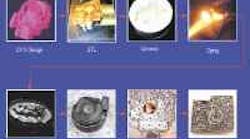The rapid-solidification process uses molten metal sprayed on a ceramic negative to produce tooling for molds and dies.
RSP Tooling's rapid-solidification machines, being designed and built by Belcan Corp., will produce mold and die tooling in hours as opposed to weeks, says RSP.
RSP Tooling LLC has signed a licensing agreement for technology that it believes will impact the industrial sector in much the same manner as the advent of CNC did. The technology, rapid solidifi-cation, produces tooling for virtually any forming process faster and more economically than conventional methods, says its supporters.
The rapid-solidification process (RSP) was developed by Dr. Kevin McHugh of the Idaho National Engineering and Environmental Laboratory with funding from the U.S. Department of Energy. RSP eliminates the need for extensive machining, polishing, and heat treating of mold and die tooling. It pumps out a practically finished insert in hours as opposed to weeks for an estimated 80% reduction in lead times.
RSP Tooling, together with the Belcan Corp., both of Solon, Ohio, are making the technology available to the public. Belcan's Specialty Equipment Engineering Division is designing and building the rapid-solidification machines, which RSP Tooling will sell and use for toolmaking services itself.
Currently, the Idaho laboratory's rapid-solid-ification machine has a part-size limit of up to 3 32 in. But RSP Tooling and Belcan have plans for machine models with the capacities to produce 6 6-in., 8 8-in., 14 14-in., and, eventually, 4 4-ft parts. The 66-in.capacity machine, estimates Jim Knirsch, president of RSP Tooling, will turn out 3,000 tools per year at a minimum savings of $300 per tool.
According to Dr. McHugh, RSP is a spray-metal process that starts with a rapid-prototyping master of the desired insert. That, in turn, is used to cast a ceramic model, which withstands the heat of the operation. Then a device that McHugh describes as a "souped-up paint sprayer" applies molten metal to the model within a closed chamber purged with an inert gas.
The metal enters a flowing stream of high-temperature, high-velocity inert gas. Aerodynamic forces of this gas over-come the surface-tension forces binding the metal together to create tiny droplets. As this atomized metal deposits on the ceramic pattern, the layers replicate all surface shapes and textures as small as 0.001 in. After the spray deposit builds up to a sizable mass, operators remove the ceramic pattern and mill the new insert's edges and bottom square.
RSP, says McHugh, shortens the design-to-part cycle time and benefits industries needing to quickly introduce new product designs. In addition, rapid solid-ification of the metal droplets actually improves the material's properties. The result is harder die parts that last longer without having to heat treat.
Energy savings is yet another benefit of rapid solidification. The process uses scrap metal, so it eliminates many steel-mill operations such as melting, casting, forging, and rolling. At the shop level, energy savings come from an elimination of machining operations and heat treating.



